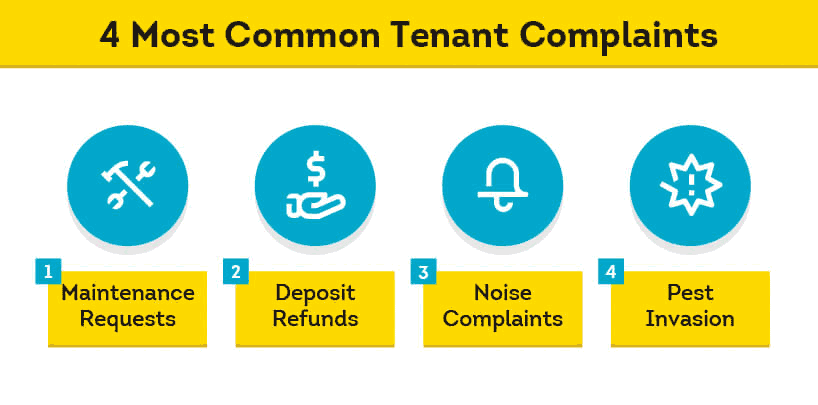Disclosure:
Remember that this material is intended to provide you with helpful information and is not to be relied upon to make decisions, nor is this material intended to be or construed as legal advice. You are encouraged to consult your legal counsel for advice on your specific business operations and responsibilities under applicable law. Trademarks used in this material are the property of their respective owners and no affiliation or endorsement is implied.
Tenant turnover can be expensive and average as much as $800, so it’s in your best interest as a landlord or property manager to keep your tenants happy. This doesn’t mean you have to jump through hoops; you can establish a reputation as a good landlord by being aware of common tenant concerns and learning the best way to address these complaints. Landlords have many rental property responsibilities such as making timely repairs and maintaining the property. So taking a proactive approach to tenant complaints can lead to higher tenant-retention rates, more referrals, and increased word of mouth marketing.
The Balance cautions landlords that if a tenant conflict escalates to the point where you’re worried about your safety, then you should remove yourself from the situation and contact the authorities if necessary. It can be hard to know how a tenant will handle conflict, so you should exercise your best judgement when addressing a tenant complaint. On the other hand, complaints don’t have to lead to conflict.
Listed below are the most common tenant complaints and the best ways to handle these types of situations.

1. Maintenance Requests
Even a landlord who regularly maintains their property is bound to get calls about repair problems.BiggerPockets points out that tenants might think any repair is an emergency, but there are certain repairs that require immediate action by landlords and can be resolved in a day or two. Electrical or gas concerns are health hazards and can be classified as maintenance emergencies while situations like appliance or carpeting repairs may have lower priority.
Either way, communication is the best way to handle a maintenance issue. It can be helpful to have a maintenance request system in place. USA.gov recommends that tenants communicate problems in writing. However, if you choose to have tenants notify you, be sure to acknowledge repair requests and provide a timeframe for your intended solution. Communicate to the tenant when the repairs will take place and arrange to be there if the tenant cannot let them in.
Follow up with the tenant once the repairs are finished to make sure the problem was fixed. This shows that you care about the property as well as their comfort, well-being, and safety.
2. Deposit Refunds
According to the Rental Protection Agency, disputes over deposit refunds is ranked as the number one complaint filed by tenants. After the tenant vacates the premises, you have a set amount of time to return their security deposit, including any portion that remains after you’ve charged for damages.
The laws governing rental security deposit returns, including deadlines and specific procedures vary by geographic area. Nolo outlines the state deadlines for itemizing and returning a tenant’s security deposit, helping you to avoid any conflicts with a tenant over a deposit refund.
Not all repair costs can be deducted from a tenant’s security deposit, so you’ll also want to be aware of which fall into the ordinary wear and tear category and which are considered damages. Nolo categorizes repairs as the responsibility of the landlord or the responsibility of the tenant.

3. Noise Complaints
In the case of a tenant noise complaint, consider taking up the issue with the property owner or the property’s homeowners association on your tenant’s behalf. If that doesn’t work, you can resort to soundproofing measures such as installing new carpeting, planting shrubbery, or increasing insulation.
If the person causing the noise disturbance happens to be one of your tenants also, it’s much easier to remedy the situation. The Balance recommends setting appropriate noise limits on typical offenders such as barking dogs or setting a noise curfew in your lease. That way, you can prevent noise complaints before they arise and deal with them promptly when they do.
A thorough screening process and knowing how to screen tenants is one of the best ways to help you find a high-quality tenant in the first place. With SmartMove landlord credit check, you are able to screen your tenant’s creditworthiness with our ResidentScore, which is a credit score specifically designed to predict the likelihood of a negative rental outcome. Plus, you can search millions of eviction records to find out if a prospective tenant has a rental history you should question.
While it may not tell you whether the eviction was due to non-payment of rent or other issues, it makes you aware of possible risk factors before signing a lease. You should also check prior landlord references during the tenant screening process to find out if there were any noise-related complaints at their previous residences.

4. Pest Invasion
According to the Rental Protection Agency, bed bug complaints (which are categorized separately from other pests and rodents) are becoming more prevalent. Both bed bugs and other pest issues make their top ten list of tenant complaints, so it’s worth taking preventative action and having your property treated on an ongoing basis.
According to Buildium, making sure a rental is pest-free is part of a landlord’s responsibility to provide a habitable dwelling for their tenants. Some states allow for tenants to pay out of pocket for extermination services and deduct the cost from their rent, but it doesn’t motivate them to renew their lease when the time comes. Since infestations (especially termites) can cause damage to the structure of your property, it’s in your best interest to quickly address pest control problems by calling an exterminator.
Conclusion
Being aware of some of the most common tenant complaints and how to handle them can help you be better prepared with a quick resolution. By being respectful of your tenant, showing genuine concern and responding in a timely fashion, you’re more likely to successfully resolve the complaint and keep your tenant happy. Happy tenants often mean lower rental turnover and more consistent rental income for you.
Communication is key to a successful landlord-tenant relationship. If you can’t or don’t wish to be available to tenants on a regular basis, consider hiring a property manager to keep the lines of communication open.
Know your applicant.
Additional Disclosure:
For complete details of any product mentioned in this article, visit www.transunion.com. This site is governed by the TransUnion Rental Screening Privacy Policy Privacy Notice located at TransUnion Rental Screening Solutions, Inc. Privacy Notice | TransUnion.



